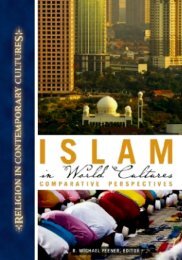Download Here - Islamic Books, Islamic Movies, Islamic Audio, All ...
Download Here - Islamic Books, Islamic Movies, Islamic Audio, All ...
Download Here - Islamic Books, Islamic Movies, Islamic Audio, All ...
Create successful ePaper yourself
Turn your PDF publications into a flip-book with our unique Google optimized e-Paper software.
Page 124 of 215<br />
Ghaemiyeh center of computerized researches www.Ghaemiyeh.com<br />
ABU TALIB The faithful of Quraysh<br />
verses criticized the unbelievers and even the saying (And they prohibit (others) from it)<br />
must concern them because if we interpret this saying to concern Abu Talib, who<br />
prohibited from harming the Prophet (s), there will be a confusion in the meaning of the<br />
verses. The second: after that <strong>All</strong>ah said: (and they only bring destruction upon their own<br />
souls). It refers to the very previous meaning and it is not suitable that the saying (And<br />
they prohibit (others) from it) means prohibiting from harming the Prophet (s) because<br />
this is a good meaning and doesnt lead to destruction. If it is said that the saying (and<br />
they only bring destruction upon their own souls) concerns the saying (and go far away<br />
from it) and not (And they prohibit (others) from it) because it means that (they kept away<br />
from him by refusing his religion) and this is dispraise so your justification is not right. We<br />
say: the meaning of the saying (and they only bring destruction upon their own souls)<br />
concerns all what mentioned previously because it is like saying that someone keeps<br />
away from a certain thing and disaffects the others from it and so he will harm himself.<br />
Harm, here, doesnt concern only one thing rather than the other. Ibn Katheer in his<br />
Tafseer[347] mentioned the first saying narrated by ibnul Hanafiyya, Qatada, Mujahid, ad-<br />
Dhahhak and others and said: This saying is more acceptable-<strong>All</strong>ah is the most awareand<br />
it is preferred by ibn Jareer.[348] An-Nasfiy, in his Tafseer printed on the margins of<br />
al-Khazins Tafseer,[349] mentioned the first saying and then said: It was said that it<br />
concerned Abu Talib but the first saying is more acceptable. Az-Zamakhshari in his<br />
Kashshaf,[350] ash-Shawkani in his Tafseer[351] and others mentioned the first saying and<br />
mentioned the second saying preceded by (it was said). Al-Aaloosi detailed the first saying<br />
then he mentioned the second and said: The imam denied it. Then he mentioned the<br />
conclusion of ar-Razi.[352] Some people generalized the verse to concern all the<br />
Prophets uncles: they were ten (uncles). They were the most of people in being<br />
with him openly and the most of people in being against him secretly.[353] You knew<br />
well that among the Prophets uncles were Hamza; the master of the martyrs and al-<br />
Abbas! You could decide after that whether these two; Hamza and al-Abbas, would be in<br />
Hell and would be concerned by this verse or not! What would the perplexed and the<br />
infatuated ones interpret more? As for me, I wouldnt be surprised to hear that. We<br />
have mentioned some examples in the first chapter of this book (At The Threshold). One<br />
of them was a tradition narrated by Orwa saying that al-Abbas and Imam Ali would be<br />
among the people of Hell! However Hamza wouldnt be better than Imam Ali in virtues<br />
so they would say about him whatever they liked!!! j. Hence the hidden secret was














